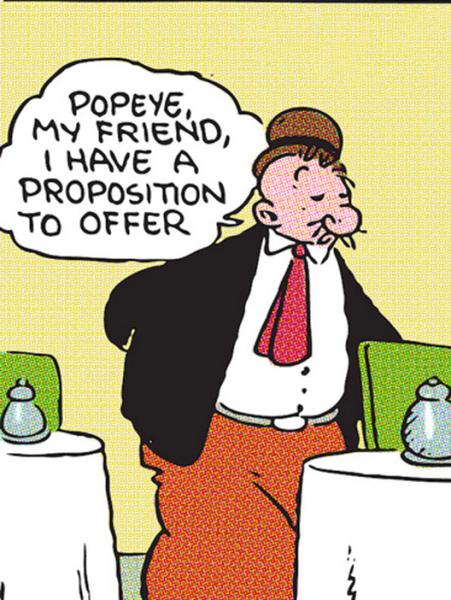Why do people continue to smoke? Why do we seem to reach a point where education and taxation have not continued to reduce the numbers of people that begin smoking? Are they not “rational” decision makers (some may prefer the term idiots) or is there something else at play?
Smokers despite being aware of the health consequences, underestimate their risk. This is a common problem for all of us and for a range of our behaviors. It is sometimes difficult to quantify the probability/risk of an event, especially when its chance of occurrence is small or when the risk might occur later, rather than now. The economic term for changing judgment based upon when something will occur is temporal discounting. For those of you of a certain age, it can be neatly summed up as “I will gladly pay you Tuesday for a hamburger today” - call it the Hamburger Bargain. [1]
The Hamburger Bargain
Prior studies suggest that smokers make the hamburger bargain a lot, discounting future events in preference for now – a small reward now is better than a more significant one later. To be fair, we all make that hamburger bargain; when we pick that delicious whatever is bad for us over the rational decision to better protect our future. Smoking is an excellent example of a small benefit now and an adverse outcome later, much later. Do smokers discount events, treat that hamburger bargain differently?
A recent study, from Italy, looked at smokers and how they discounted future health events. About 160 smokers and non-smokers were recruited through social networks and completed surveys about 15 smoking-related outcomes, like yellow teeth, sore throat, high blood pressure or lung cancer. Participants identified how likely they thought it was that they might develop these outcomes, how fearful they were of the outcomes and when those outcomes would occur for someone smoking 10 cigarettes a day. Researchers provided pre-set choices to help standardize responses between the two groups. They also gathered information on age, gender, current smoking status and for smokers a validated survey on their degree of nicotine dependence. Both smokers and non-smokers tended to cluster outcomes into mild, like “sore throat” or severe, like “heart attack.” [2]
- Smokers perceived the onset of adverse events, mild or severe, farther into the future than non-smokers. They exhibited greater temporal discounting.
- When consequences were severe - Greater fear of those consequences moved the perception of possible events closer, reducing temporal discounting. This was true for smokers and non-smokers.
- When consequences were mild - Greater fear of those consequences again moved the perception of possible events closer. But lower fear did not, possible consequences were moved further back in time. And again, this was true for smokers and non-smokers.
- Smokers and non-smokers differed not in direction but in degree, for smokers consequences were always later than for non-smokers
The Hamburger Bargain's Lesson and a Paradox
We perceive the timing of a future event in complex ways. The fear of horrible outcomes moves our perception of when that might occur closer. In hamburger bargain terms, the fear of a very bad consequence from not paying would make us agree to pay on Monday rather than Tuesday. Our perception of time is malleable and fear is a big driver.
The fact that smokers and non-smokers acted in similar ways means these findings are generalizable outside of smoking. Consider the inevitable tempo of flu vaccination. In October, vaccination can wait, after all the consequences are low, just a few days of discomfort and there aren't a lot of people getting sick, so how fearful should you be? Three months from now, fear and the perception of risk will have changed, influenza has not. More news stories will mention cases that end in rapid, unanticipated deaths and while not happening to people you know, it will be posited as occurring fearfully closer to home. The perception of higher risk and fear result in reduced temporal discounting and the rush for vaccination and Tamiflu.
There is a paradox here for physicians and patients. The more medical care turns acute dreadful illness into chronic less feared illness the more a patient will discount the consequences, and the less they may heed the need for preventative care. Polio, measles, high blood pressure - all are less feared, less frequent and more susceptible to being perceived as events in a distant future. Perhaps this is part of the refusal to be vaccinated and the laissez-faire attitude some patients show in taking the blood pressure medications. It turns out that the hamburger bargain had much to tell us.
[1] This is from the Popeye cartoons that were popular in mid-century.
[2] Mild – gingivitis, sore throat, shortness of breath, yellow teeth, halitosis, tachycardia and high blood pressure. Severe – pulmonary emphysema, lung cancer, heart attack and ictus (seizures)
Source: The onset time delaying effect: smokers vs non smokers place the adverse consequences of smoking further in the future Journal of Cognitive Psychology DOI: 10.1080/20445911.2017.1415346




